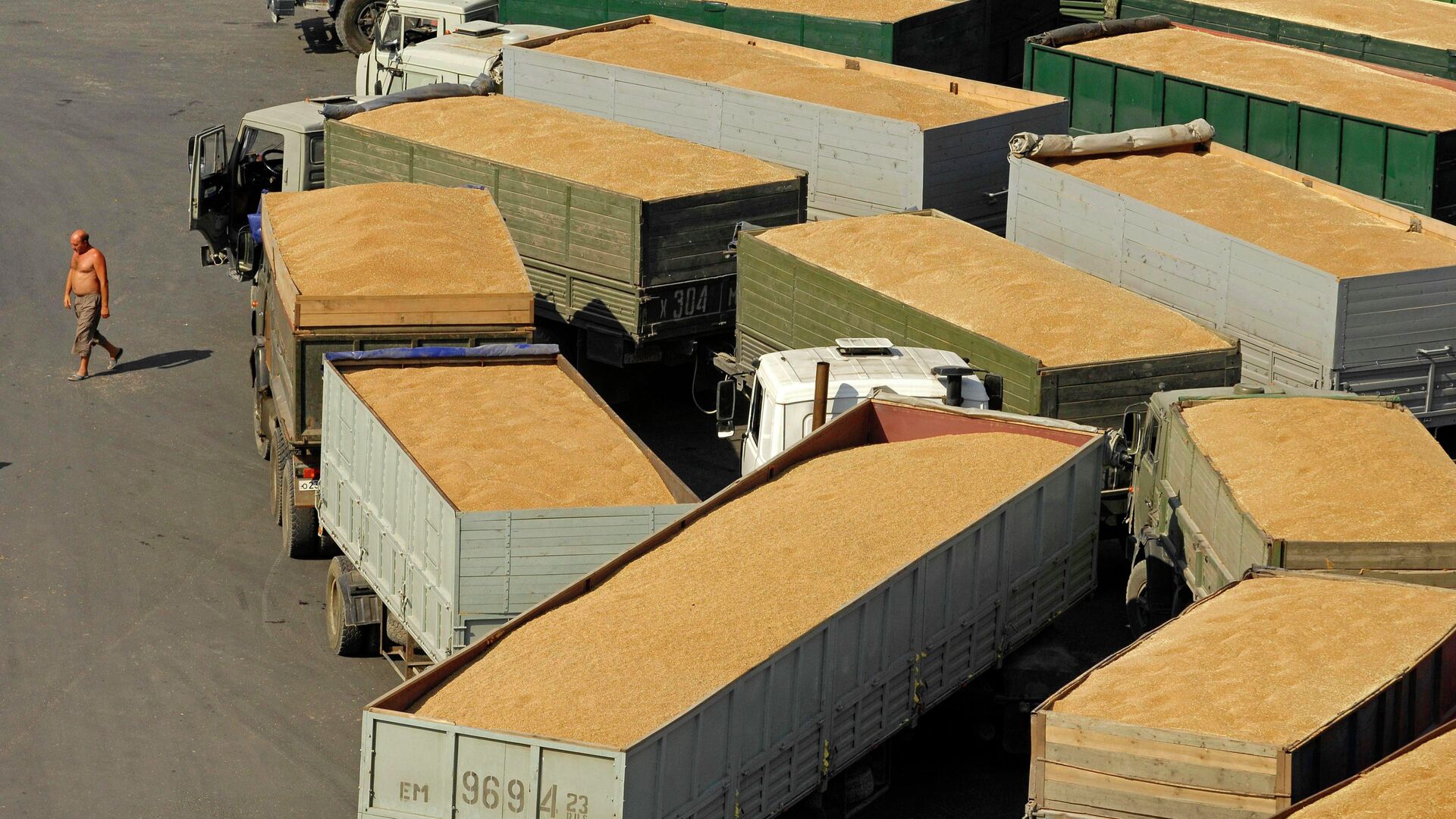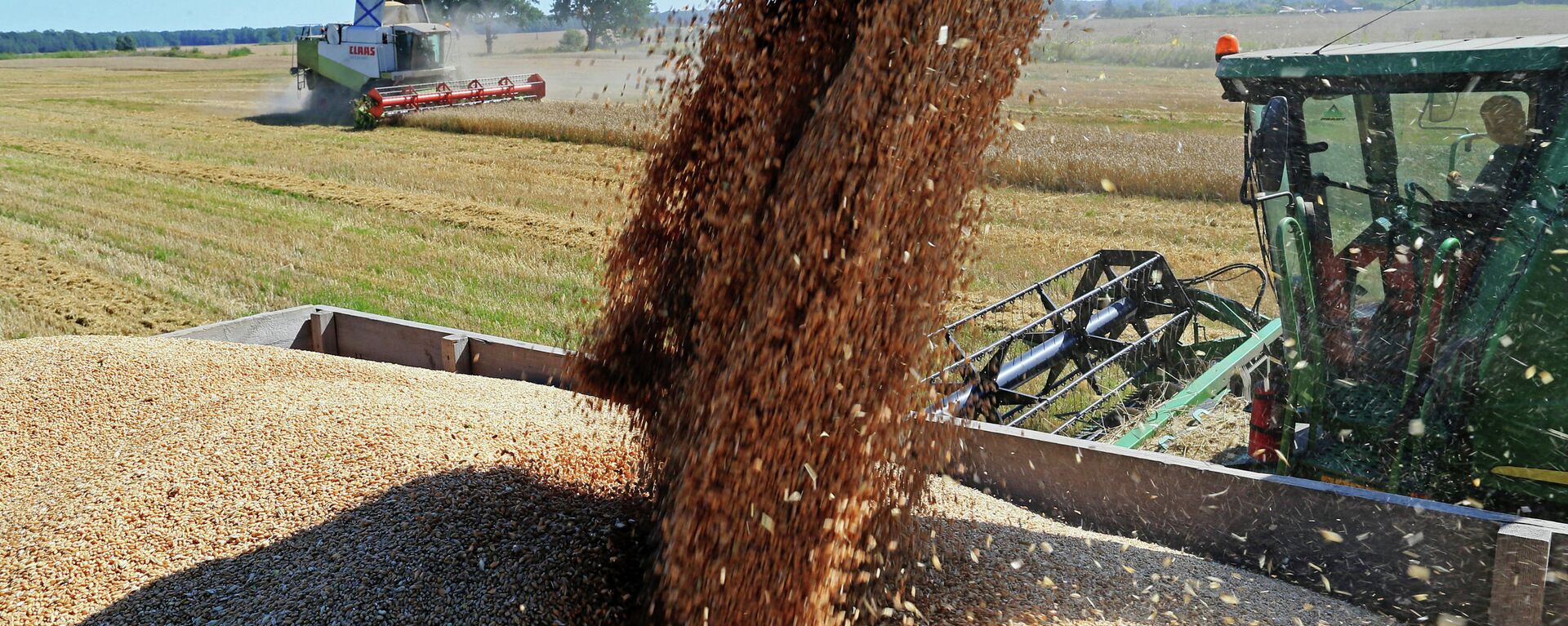https://sputnikglobe.com/20220713/scoop-getting-ukrainian-grain-shipping-route-up-and-running-may-take-one-month-source-says-1097267311.html
Scoop: Getting Ukrainian Grain Shipping Route Up and Running May Take One Month, Source Says
Scoop: Getting Ukrainian Grain Shipping Route Up and Running May Take One Month, Source Says
Sputnik International
The ongoing security crisis in Ukraine has sparked concerns about global food availability amid difficulties in shipping the Eastern European grain-producing... 13.07.2022, Sputnik International
2022-07-13T10:50+0000
2022-07-13T10:50+0000
2023-07-17T11:37+0000
food security
negotiations
grain
shipment
black sea grain deal
https://cdn1.img.sputnikglobe.com/img/16024/83/160248384_0:153:3011:1847_1920x0_80_0_0_990cd24c053b613f9dfc0d05846c7232.jpg
The process of establishing a corridor for getting Ukrainian grain-laden cargo ships out of ports into the Black Sea for shipment abroad may take up to a month to establish, and Turkey and the United Nations would monitor implementation if a consensus were reached, a diplomatic source familiar with discussions has informed Sputnik.“The main thing now is to reach a consensus and form an operational control center in Istanbul,” the source said, referring to the implementation mechanism.The information comes against the background of a meeting between representatives from Russia, Ukraine, Turkey and the UN in Istanbul on Wednesday afternoon to discuss the “grain issue,” i.e. ways to resolve the problem of shipping the Ukrainian grain harvest out of the country amid the ongoing military crisis and Russia’s de-facto control of the vast majority of the coastline.Kremlin spokesman Dmitry Peskov confirmed later in the day that work on the grain issue was in progress, that "it is being conducted via military officials," and that further information will be provided as deemed necessary.UN officials have warned repeatedly of the dangers of a looming global food crisis amid a shortage of Russian and Ukrainian foodstuffs and fertilizers on world markets. Together, the countries account for up to 30 percent of global wheat exports, 20 percent of maize, 16 percent of fertilizers, and over 50 percent of sunflower oil. Russia and Belarus together are also among the largest producers of nitrogen fertilizers in the world.The United States and its European allies have blamed Russia for the looming crisis, accusing Moscow of deliberately blocking shipments to ramp up prices. Russian officials have parried these claims, saying cargo ships aren’t able to safely leave Ukrainian Black Sea ports thanks to mines planted there by Ukraine’s military, and pointing to Western sanctions against Russian food and fertilizer exports which they say complicate matters.The danger of the Ukrainian security crisis contributing to food shortages affecting wealthy nations and the Global South in particular has not been lost on observers, with African officials and market analysts in particular sounding the alarm and calling for urgent action to find ways around sanctions and ink deals directly with Moscow without Western intermediaries. Last month, Senegalese President and African Union chief Macky Sall warned that the Western bloc’s anti-Russian sanctions threaten to undermine the continent’s food security and to leave it without adequate access to both grain and fertilizers.
https://sputnikglobe.com/20220701/putin-tells-modi-russia-remains-reliable-grain-and-fertilizers-producer-supplier-1096860332.html
https://sputnikglobe.com/20220705/russia-may-harvest-record-90-mln-tons-of-wheat-in-2022---reports-1096989529.html
https://sputnikglobe.com/20220712/rossiya-segodnya-hosts-virtual-conference-discussing-africas-food-securityme-thinks-this-1097243173.html
Sputnik International
feedback@sputniknews.com
+74956456601
MIA „Rossiya Segodnya“
2022
News
en_EN
Sputnik International
feedback@sputniknews.com
+74956456601
MIA „Rossiya Segodnya“
Sputnik International
feedback@sputniknews.com
+74956456601
MIA „Rossiya Segodnya“
food security, negotiations, grain, shipment, black sea grain deal
food security, negotiations, grain, shipment, black sea grain deal
Scoop: Getting Ukrainian Grain Shipping Route Up and Running May Take One Month, Source Says
10:50 GMT 13.07.2022 (Updated: 11:37 GMT 17.07.2023) The ongoing security crisis in Ukraine has sparked concerns about global food availability amid difficulties in shipping the Eastern European grain-producing giant’s output out of the country. The US and its allies have blamed Russia for the crisis. Moscow has dismissed the claims, and accused the West of exacerbating the crisis through sanctions.
The process of establishing a corridor for getting Ukrainian grain-laden cargo ships out of ports into the Black Sea for shipment abroad may take up to a month to establish, and Turkey and the United Nations would monitor implementation if a consensus were reached, a diplomatic source familiar with discussions has informed Sputnik.
“There is an understanding that this process will not be fast, but there is a general desire that the process should not drag on for more than a month, that it be within this time frame,” the source said.
“The main thing now is to reach a consensus and form an operational control center in Istanbul,” the source said, referring to the implementation mechanism.
The information comes against the background of a meeting between representatives from Russia, Ukraine, Turkey and the UN in Istanbul on Wednesday afternoon to discuss the “grain issue,” i.e. ways to resolve the problem of shipping the Ukrainian grain harvest out of the country amid the ongoing military crisis and Russia’s de-facto control of the vast majority of the coastline.
Kremlin spokesman Dmitry Peskov confirmed later in the day that work on the grain issue was in progress, that "it is being conducted via military officials," and that further information will be provided as deemed necessary.
UN officials have warned repeatedly of the dangers of a looming global food crisis amid a shortage of Russian and Ukrainian foodstuffs and fertilizers on world markets. Together, the countries account for up to 30 percent of global wheat exports, 20 percent of maize, 16 percent of fertilizers, and over 50 percent of sunflower oil. Russia and Belarus together are also among the largest producers of nitrogen fertilizers in the world.
The United States and its European allies have blamed Russia for the looming crisis, accusing Moscow of deliberately blocking shipments to ramp up prices. Russian officials have parried these claims, saying cargo ships aren’t able to safely leave Ukrainian Black Sea ports thanks to mines planted there by Ukraine’s military, and pointing to Western sanctions against Russian food and fertilizer exports which they say complicate matters.
Earlier in the day, a diplomatic source informed Sputnik that Russia is tying negotiations in Istanbul to the removal of obstacles on the export of foodstuffs from Russia. “This issue cannot be ignored. There are obstacles for the Russian side in the field of ship insurance, logistics, transportation services and banking operations in connection with the imposed sanctions,” the source
said.
The danger of the Ukrainian security crisis contributing to food shortages affecting wealthy nations and the Global South in particular has not been lost on observers, with African officials and market analysts in particular
sounding the alarm and calling for urgent action to find ways around sanctions and ink deals directly with Moscow without Western intermediaries. Last month, Senegalese President and African Union chief Macky Sall
warned that the Western bloc’s anti-Russian sanctions threaten to undermine the continent’s food security and to leave it without adequate access to both grain and fertilizers.




